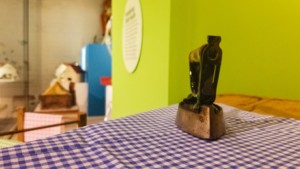FUN UNPLUGGED: LITTLE ADULTS EXPLORES CHILDHOOD AS ADULTHOOD
FOR IMMEDIATE RELEASE
DATE: November 17, 2016

See how nonelectric toys were creatively used to teach etiquette, adult behavior, and gender roles at the DuPage County Historical Museum’s (102 E. Wesley St., Wheaton, Ill.) new exhibit Fun Unplugged: Little Adults, opened November 12. To learn more, visit dupagemuseum.org. Photo © Wheaton Park District 2016.
DuPage County, Ill.—Childhood was not always playtime. It was once a chance to contribute to the family and learn etiquette, adult behavior, and gender roles, according to Ashley Downing, Museum Curator at the DuPage County Historical Museum (102 E. Wesley St., Wheaton, Ill.), whose new exhibit Fun Unplugged: Little Adults, opened November 12, explores this history.
Located in the room across from the Museum’s electric HO gauge model railroad, the exhibit displays popular and homemade toys that entertained children without electricity, from army figurines to tea sets, board games, dollhouses, erector sets, irons, stoves, cabins, and more.
“We’re trying to show how childhood was used to reinforce adult ideas,” Downing said. “With little girls, dollhouses taught you how to care for a house, tea parties taught you social etiquette,
[and] baby dolls taught you how to take care of a baby. For boys, there were different types of technology to push them into being architects or engineers.”
Before the middle of the twentieth century, children were predominantly viewed as little adults, smaller in stature but capable of proper behavior, etiquette, morals, and productivity. Downing recalled accounts of children as young as five being expected to earn their keep.
“Between helping the family and earning money, or working in the fields, you didn’t have time to play,” she said. “If you were wealthy, you had a nice childhood. If you were poor, you worked, even if it was taking care of kids or cleaning around the house. It was almost like the wealthy children had toys to simulate what the poor children were already doing.”
The philosophy of little adults was especially strong before the advent of child labor laws—chief among them the Fair Labor Standards Act, signed in 1938—plus nationwide public education, strong economies that allowed time for leisure, and shifts in gender roles that continue today.
Perhaps no artifact demonstrates this better than What Shall I Be? The Exciting Game of Career Girls, released in 1966 by Selchow and Righter, the company behind Parcheesi and Scrabble.
As they went around the board, two to four players collected school cards, subject cards, and personality cards, different combinations of which recommended just six careers: actress, airline hostess, ballet dancer, nurse, model, and teacher.
“It was trying to push little girls into entering the workplace, but in limited roles,” said Downing. “Today, almost everyone would be like, ‘Wow, that’s something.’”
In 1976, Selchow and Righter released a second edition of the game, changing the six careers to astronaut, surgeon, news commentator, lawyer, theater director, and jockey.
“We’re getting better with the fact that it’s not so separated,” she said. “If you go into a toy store, not all of the girls’ toys are pink anymore.”
In fact, pink was for centuries considered suitable for boys, while blue was for girls, according to historian Jo B. Paoletti’s Pink and Blue: Telling the Girls From the Boys in America.
“‘The generally accepted rule is that pink, being a more decided and strong color, is more suitable for the boy, while blue, which is more delicate and dainty, is prettier for the girl,’” wrote Paoletti, quoting a Ladies’ Home Journal article from 1918. It wasn’t until the first Baby Boomers arrived in the 1940s that manufacturers color-coded products for each gender.
It also wasn’t until the 1940s, with incomes and suburban expansion rising dramatically after World War II, that childhood started to become play, not work.
“Parents were trying to increase the length of childhood,” Downing said. “There were so many more toys, and varied toys. They weren’t purely educational things.”
According to research, the phenomenon seems uniquely Western, said Downing.
“In other countries, kids are watching babies and doing the laundry and going to market on their own,” she said. “We try to keep [our children] in that sense of innocence a lot longer.”
To learn more about Fun Unplugged: Little Adults, visit dupagemuseum.org or call 630.510.4941. Admission to the DuPage County Historical Museum is always free.
Written by: Brett Peto

